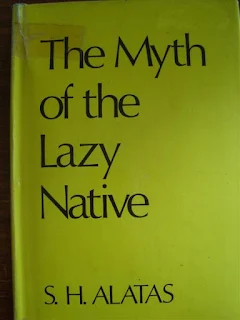THE MYTH OF THE LAZY NATIVE (1977)
Syed Hussein Alatas
Professor of Malay Studies, University of Singapore
A study of the image of the Malays, Filipinos and Javanese from the 16th to the 20th century and its function in the ideology of colonial capitalism.
Reading this book, I was reminded of this joke.
Syed Hussein Alatas
Professor of Malay Studies, University of Singapore
A study of the image of the Malays, Filipinos and Javanese from the 16th to the 20th century and its function in the ideology of colonial capitalism.
Reading this book, I was reminded of this joke.
An American venture capitalist was visiting a picturesque lagoon somewhere in the secluded interior of Mexico. He was fascinated with the scenery and quickly his capitalistic mind went overdrive. He saw great potential in that place, with its lovely blue sea and its abundant sea produce. He was perplexed that none of the locals was keen to develop the area. He approached one of the Pedros slouched against a tree enjoying his afternoon siesta chomping on his half burnt cigar and a fishing rod dangling lazily between his thighs. Even his faithful dog seem to be suspended in time with no urgency, just enjoying his forty winks. He woke the annoyed Mexican from his slumber.
"Buenas tardes, Señor! You own the boats here, Señor?" he asked.
"Si, Señor," the Mexican answered, half annoyed that his sweet dream was disturbed by this fast-talking American kid in accented Spanish. He squinted his eyes against the glaring sun.
The American went on a rant of his plans to develop his serene hideout. He would develop the lagoon, buy big fishing vessels, go deep sea fishing, make big bucks, improve his life, go holidays with family, enjoy life and so on and forth.
The Mexican, still bedazzled after being rudely awoken from his snooze, politely asks him, "All that for what, Señor?"
"To have a good life, of course. To enjoy a quality life. To go holidays to some exotic place, laze away and benefit from the fruit of your labour!"
"But, Señor. I am already doing that right now. Having a good life doing all the things that you said until you disturbed me!"
This is a classic text often quoted in discussions of social anthropology, politics and history. It argues that the colonial masters have put labels of being lazy or indolent on the natives of the South East Asia, i.e. the Malays, the Javanese and the Filipinas, as their activities do not conform to the conquerer's agenda of the day. The masters, being Spaniards, Dutch and the British have uniformly labelled their subjects as lazy, clueless on the concept of punctuality, of being 'less civilised' and many other derogatory names.
The natives refuse to plant cash crops which would enrich the colonists. They are not so keen to be bogged down by the masters' regimented schedule of work like in the mines because they see no need to be involved in such activities as they already have their own work to tend to. They may appear to be very free as the actual planting of padi only means two months in a year. They actually involve themselves in many other related and non-agricultural related activities.
This trait of not conforming to the Imperial whims and fancies is a form of resistance. The Westerners labelled them as lazy to justify their action of bringing in droves foreign labourers into Malaya. The Malay ruling class also had the same outlook on their subjects, when they themselves, are the spoilt indolent ones.
The writer also takes a swipe at the aristocrats who seem to parrot the tune of the Westerners. These stereotyping continued in their publications, Revolusi Mental (1971) and Malay Dilemma (1970) by Mahathir Mohamed. The 19th century was a time when there was much research into the subject of race and the superiority of one over the other. Many renowned thinkers including Marx and Engels are guilty of downplaying the Asiatic races. They overlook the Easterners' already established track record of an established advanced civilisation, complex trading web and economic achievements. They conveniently label them as lazy when the privateers themselves plundered and created a monopolistic trade policy.
In summary, the author asserts that the natives are anything but innately lazy. It is just a label put on by the Western Imperialist powers to justify the actions and fulfilling their political agenda. Interestingly, the ruling class that came after Independence found it just too convenient to continue their colonial masters' modus operandi as it also fulfils theirs.
P/S. The post-colonial administrators believe governing in the style of their previous colonial masters much to their favour. They continue downtrodding the masses with their propaganda, suppressing knowledge, keeping them unaware and encouraging corruption to fulfil their unquenchable desire to stay in power!
P/S. The post-colonial administrators believe governing in the style of their previous colonial masters much to their favour. They continue downtrodding the masses with their propaganda, suppressing knowledge, keeping them unaware and encouraging corruption to fulfil their unquenchable desire to stay in power!





No comments:
Post a Comment